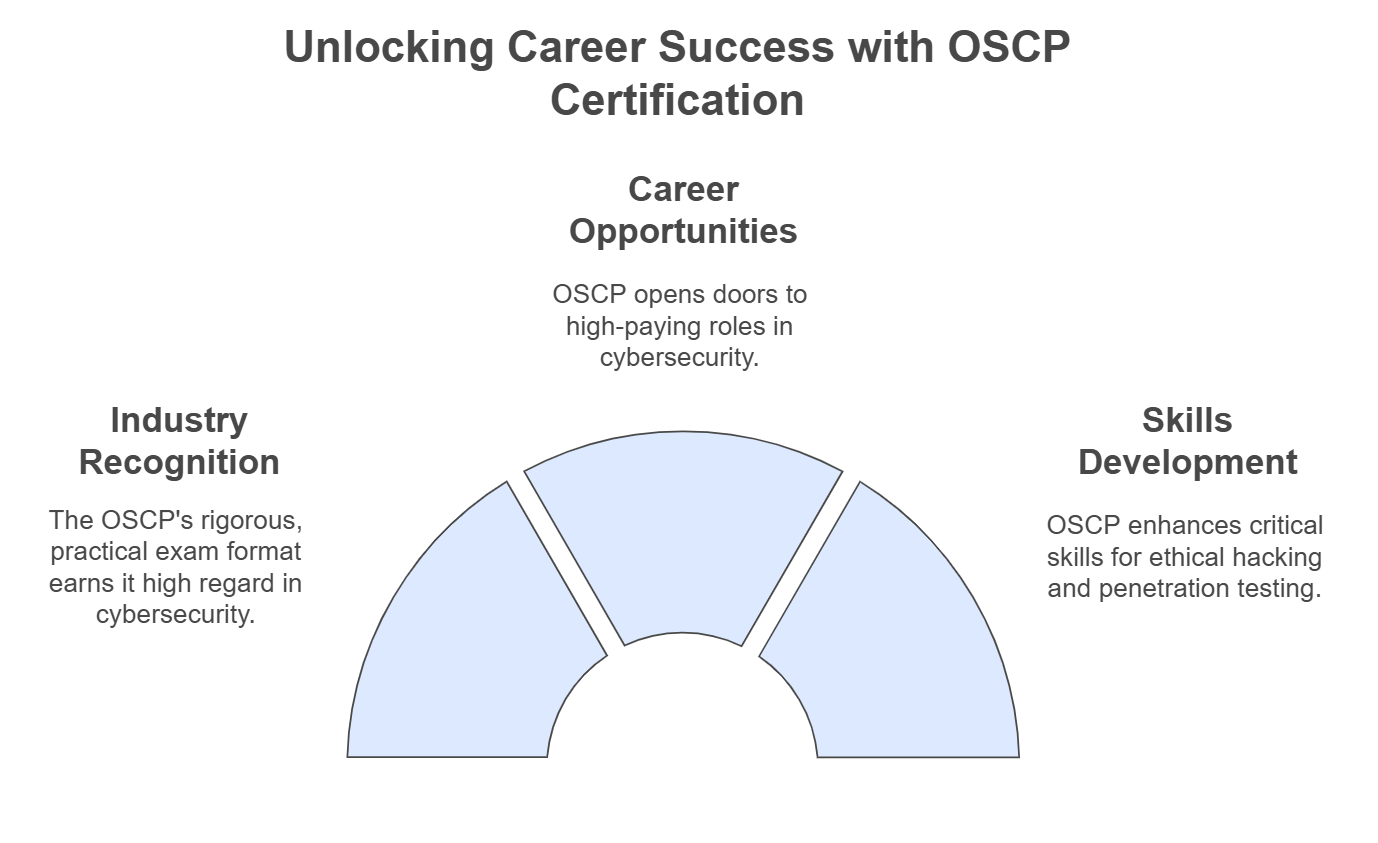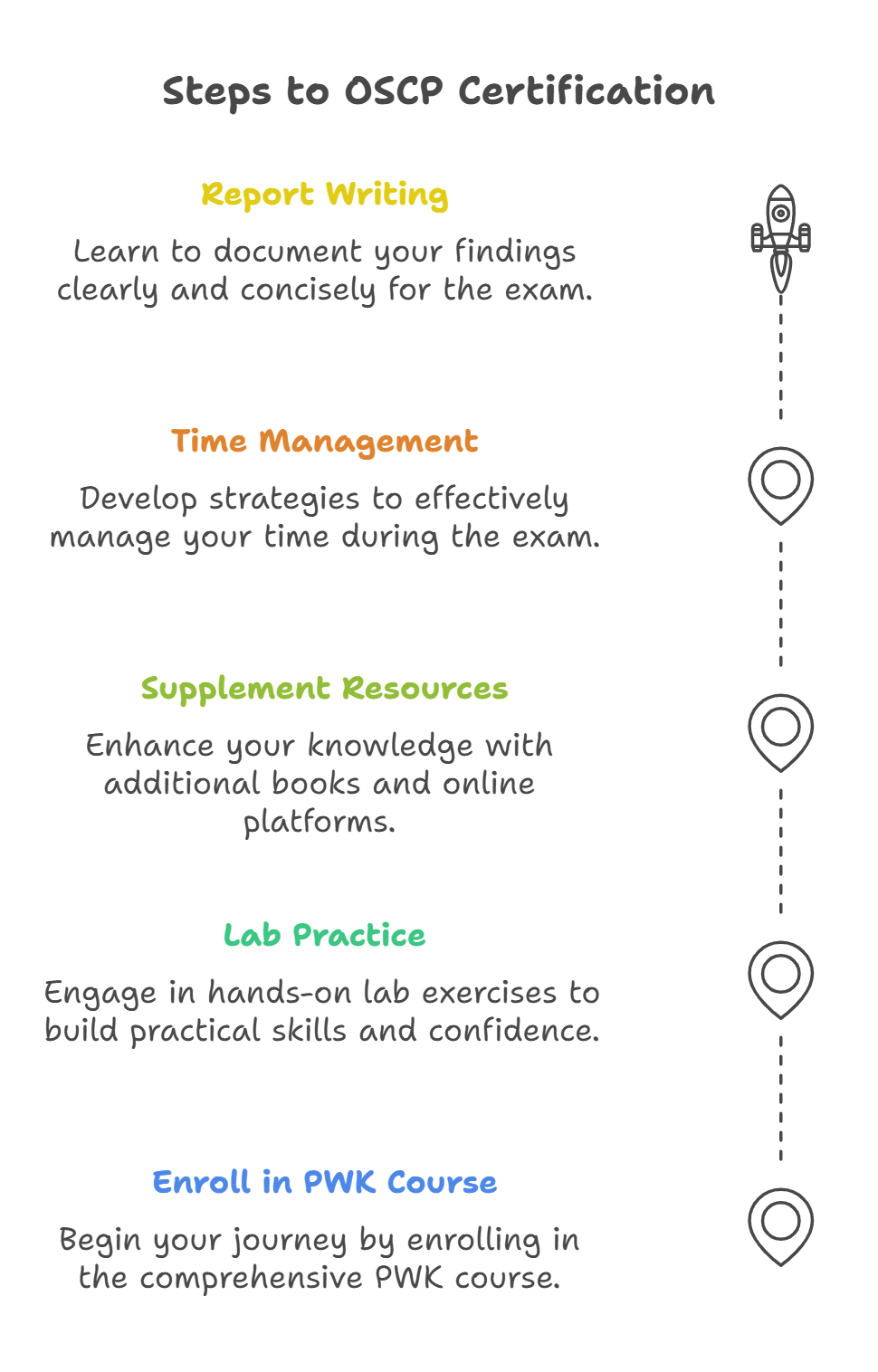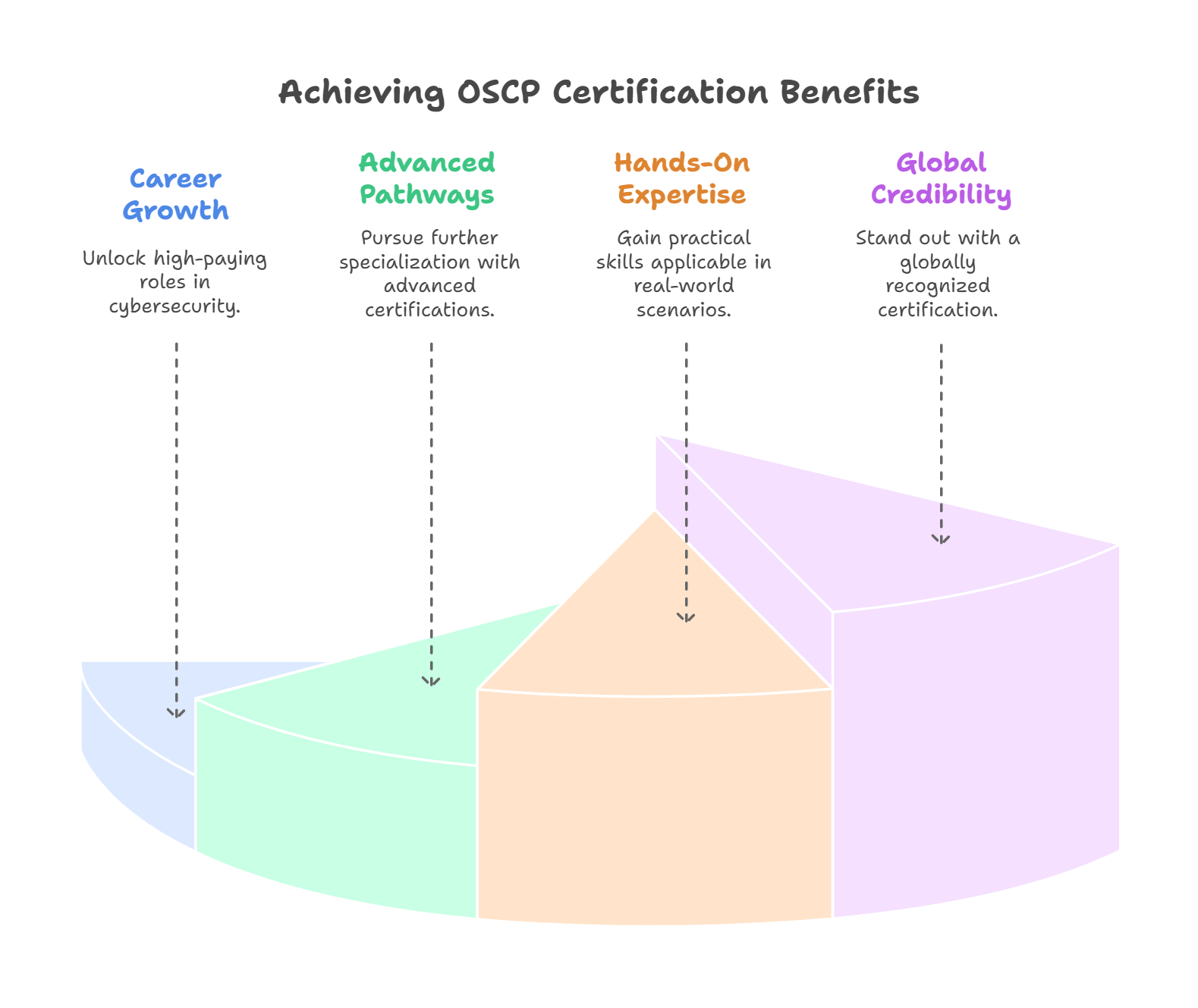Table of Contents
- Why Is OSCP Valuable?
- 1. Industry Recognition
- 2. Career Opportunities
- 3. Skills Development
- How to Prepare for Cybersecurity Certification OSCP
- Key Challenges of the OSCP Exam
- Benefits of Earning the Cybersecurity Certification OSCP
- ACSMI Resources for OSCP Preparation
- Final Thoughts
- FAQs About Cybersecurity Certification OSCP
The Highest Cybersecurity Certification, OSCP (Offensive Security Certified Professional), is one of the most respected and challenging cybersecurity certifications available. Offered by Offensive Security, this certification is aimed at individuals who want to specialize in penetration testing and ethical hacking. Unlike traditional certifications that test theoretical knowledge, the OSCP certification focuses heavily on practical skills.
The exam for the OSCP involves real-world penetration testing scenarios where candidates must exploit vulnerabilities in a controlled environment. They are required to compromise multiple systems within 24 hours, submit a detailed report, and showcase their skills in exploiting common vulnerabilities. This hands-on approach tests both technical expertise and the ability to think creatively under pressure.
OSCP is considered a benchmark in the cybersecurity industry for offensive security and is highly sought after by employers in sectors such as government, financial institutions, technology, and consulting.
Why Is OSCP Valuable?

1. Industry Recognition
The OSCP is one of the most recognized cybersecurity certifications. Its reputation within the industry is largely due to the rigorous and practical nature of the exam. Unlike theoretical exams, the OSCP exam requires candidates to apply their knowledge in real-world scenarios, making it a highly credible certification in the cybersecurity world. Employers highly regard this certification because it demonstrates a candidate's ability to handle and solve complex cybersecurity challenges that are essential for penetration testing and ethical hacking.
2. Career Opportunities
The demand for cybersecurity professionals is growing exponentially, especially for roles in penetration testing, red teaming, and ethical hacking. The OSCP certification positions you for high-paying roles, including:
-
Penetration Tester: Ethical hackers who evaluate the security of systems by exploiting weaknesses.
-
Red Team Specialist: Security experts who simulate cyberattacks to identify vulnerabilities within an organization.
-
Security Consultant: Professionals who advise companies on how to secure their systems and data.
The OSCP is a certification that demonstrates your ability to take action in real-world scenarios, giving you an edge in job interviews and career progression.
3. Skills Development
The OSCP certification focuses on the practical aspects of penetration testing, enabling you to develop a variety of critical skills, such as:
-
Privilege Escalation: Learning how to escalate privileges to gain administrative access to compromised systems.
-
Web Application Vulnerabilities: Identifying and exploiting vulnerabilities in web applications.
-
Buffer Overflows: Performing advanced exploits related to buffer overflows to take control of systems.
-
Post-Exploitation: Learning how to maintain access to compromised systems and how to cover your tracks.
These skills are essential for any ethical hacker or penetration tester and are highly valued by employers.
How to Prepare for Cybersecurity Certification OSCP
The Cybersecurity Certification Roadmap for the OSCP certification is a challenging exam that requires both theoretical knowledge and practical skills. Here’s a step-by-step breakdown of how you can prepare for the OSCP exam:

1. Enroll in the PWK (Penetration Testing with Kali Linux) Course
The Penetration Testing with Kali Linux (PWK) course is the official training course provided by Offensive Security for OSCP preparation. The course provides comprehensive coverage of penetration testing techniques and tools. It covers everything from information gathering to privilege escalation to exploitation techniques.
-
Topics Covered in PWK Course:
-
Network services and exploitation
-
Web application vulnerabilities
-
Buffer overflow exploitation
-
Metasploit Framework usage
-
Vulnerability analysis and penetration testing
-
The course includes a combination of videos, readings, and hands-on lab exercises to help you develop the practical skills needed to pass the OSCP exam.
2. Lab Practice Is Key
Hands-on practice is essential for success in the OSCP exam. The PWK course comes with virtual labs designed to simulate real-world environments. These labs allow you to practice exploiting various vulnerabilities and to apply the concepts learned in the course.
-
Why Lab Practice Is Important:
-
Simulated Real-World Environments: The labs replicate real systems, providing a safe space to practice and learn penetration testing techniques.
-
Building Confidence: The more labs you complete, the more confident you’ll feel during the actual exam.
-
Problem-Solving: Each lab presents unique challenges, teaching you to think creatively and solve problems as they arise.
-
You should aim to complete as many lab exercises as possible, and ensure you understand the process from start to finish for each challenge.
3. Supplement with External Resources
While the PWK course provides a solid foundation, additional resources can help to fill knowledge gaps and provide alternative methods to tackle problems. A few great supplementary resources include:
-
Books: Books like "The Web Application Hacker’s Handbook" or "Hacking: The Art of Exploitation" provide in-depth information on penetration testing techniques.
-
Online Communities: Forums such as r/hacking or Null Byte offer valuable tips and solutions to common problems.
-
Additional Platforms: Platforms like Hack The Box and TryHackMe offer online penetration testing challenges that complement OSCP training.
Supplementing your learning with resources outside of the official PWK course will ensure you have a broader understanding of cybersecurity techniques.
4. Brush Up on Time Management
The OSCP exam is time-constrained and requires careful management of time. You’ll have 24 hours to complete all tasks, which means it’s important to allocate your time wisely during both your exam and preparation.
-
Time Management Tips:
-
Practice Time Constraints: During lab exercises, set time limits for each machine to simulate the exam environment.
-
Prioritize: Start with the easiest machines and move on to the harder ones. This strategy helps you maximize your chances of success.
-
Don’t Get Stuck: If you’re stuck on a particular task, move on and come back to it later to ensure you have enough time to complete the exam.
-
5. Learn Report Writing
The OSCP exam requires you to submit a detailed report of your findings. This report should document the steps you took to exploit the vulnerabilities, as well as how you compromised the systems.
-
Report Writing Tips:
-
Document Everything: From the beginning of the exam, make sure to document every step you take. This will save time during the report-writing phase.
-
Clarity is Key: The report must be clear and concise, explaining each step of your process in a way that someone else can follow.
-
Key Challenges of the OSCP Exam
The OSCP exam is one of the most demanding certification exams in cybersecurity. Here are some of the key challenges you may face during the exam:
Real-World Scenarios
The OSCP exam simulates real-world penetration testing environments. This means the challenges you face are complex and require in-depth problem-solving. Unlike theoretical exams, where you may be given a direct answer, OSCP tests your ability to adapt and use your knowledge in practical situations.
Time Pressure
The OSCP exam lasts for 24 hours, which can be a significant challenge. You must complete multiple tasks within the time frame, and managing your time efficiently is key to passing the exam.
No Hints
Unlike many other exams, the OSCP exam provides no hints. You must rely entirely on the skills you’ve developed during your training. This requires thorough preparation and a deep understanding of penetration testing techniques.
Benefits of Earning the Cybersecurity Certification OSCP
Achieving the Cybersecurity Certification Malaysia and OSCP certification opens up a world of benefits, both personally and professionally. Here are the key benefits of obtaining the OSCP certification:

1. Accelerated Career Growth
The OSCP certification is highly respected in the cybersecurity industry. With this certification, you’ll be able to unlock high-paying roles like penetration tester, red team operator, and security consultant. These roles are essential to modern enterprises, making the OSCP an excellent investment for your career.
2. Pathway to Advanced Certifications
Once you’ve earned the OSCP, you’ll be well-positioned to pursue more advanced certifications, such as OSWE (Offensive Security Web Expert) or OSEE (Offensive Security Exploitation Expert). These certifications allow you to specialize further and tackle more complex security challenges.
3. Actionable, Hands-On Expertise
The OSCP exam tests your ability to apply penetration testing techniques in real-world scenarios. This gives you hands-on expertise that can be used immediately in the workplace. The practical skills you gain from the OSCP exam will make you an invaluable asset to any organization.
4. Globally Recognized Credibility
The OSCP is a globally recognized certification, which means it will help you stand out to employers around the world. This certification is proof of your ability to conduct thorough penetration tests and find vulnerabilities before malicious hackers can exploit them.
ACSMI Resources for OSCP Preparation
ACSMI (American Cyber Security and Management Institute) offers a comprehensive suite of resources that can help you prepare for the OSCP exam. Their 400+ modules cover advanced topics like buffer overflows, scripting, privilege escalation, and web application exploitation, which are all critical for OSCP preparation.
By combining ACSMI resources with the PWK course offered by Offensive Security, you’ll be able to access a complete set of resources that will help you master the necessary skills and techniques required to pass the OSCP.
Final Thoughts
The OSCP certification is one of the most prestigious credentials in cybersecurity, particularly for those specializing in penetration testing and ethical hacking. The rigorous, hands-on nature of the exam makes it one of the most respected certifications globally. By enrolling in the PWK course, dedicating time to practice, and supplementing your learning with resources like ACSMI, you can ensure success in this challenging exam and take your career to the next level.
FAQs About Cybersecurity Certification OSCP
1. Is the Cybersecurity Certification OSCP suitable for beginners?
The OSCP is not recommended for complete beginners, as it requires a strong understanding of Linux, networking, and basic cybersecurity principles. However, motivated individuals with a solid foundation can succeed with the help of supplementary resources.
2. How much time does preparation require?
Preparation for the OSCP typically takes 3-9 months, depending on your prior experience. This includes time spent on the PWK course and additional practice in the labs.
3. Are there any prerequisites for OSCP?
There are no formal prerequisites for the OSCP, but familiarity with Linux, networking, and basic penetration testing is strongly recommended.
4. Can I retake the OSCP exam if I fail?
Yes, you can retake the OSCP exam if you fail. However, you may need to pay additional fees. Make sure to thoroughly review your preparation before attempting the exam again.
5. How does ACSMI help with OSCP preparation?
ACSMI provides advanced modules that align well with the OSCP curriculum. Their practical labs and exercises can help reinforce the skills you need to succeed in the OSCP exam.

Leave a Reply